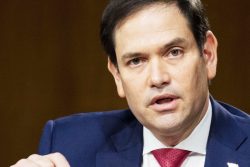PARIS, (Reuters) – Laurent Fignon died of cancer yesterday at the age of 50 with two Tour de France wins to his name — but the eight seconds that cost him a third triumph will live just as long in the memory.
On July 23 1989, after 21 stages and 3,285-km of gruelling cycling, Greg LeMond pipped the Frenchman by the Tour’s narrowest margin in one of the great finishes of all time.
Fignon had started the time trial with a 50-second lead only to see his American rival go 58 seconds faster in the 24.5-km final stage.
“Even on the podium I was feeling uncomfortable and sorry because Fignon had also won the Tour,” LeMond told France 24 television from his Minnesota home yesterday.
“He was a priceless man and I was choked when I heard he had died. A week ago I was told he was not well but he was very strong minded and I liked him because he has always been true to himself and I regard him as one of the best riders of the last 35 or 40 years.”
RadioShack team manager Alain Gallopin, Fignon’s physio and friend, told Reuters the rider died at the Pitie-Salpetriere hospital in Paris at 1230 local time (1030 GMT).
“I have lost a brother. I saw him yesterday and he was still fighting,” said Gallopin.
TYPICAL
FRENCHMAN
In a book published in June 2009, ‘We Were Young and Carefree’, Fignon said he had been diagnosed with cancer.
He also admitted having used doping products but said he did not know if they had caused his illness.
“I don’t want to die at 50 but if my cancer is incurable, what can I do?,” he told Paris-Match magazine in January.
“I love life, I love a good laugh, travel, books, good food. I’m a typical Frenchman. I’m not afraid of death, I just don’t want to die.”
Fignon’s sport was soccer until he rode his first cycle race in 1976 and won it.
He turned professional in 1982, winning his first trophy the same year, the Criterium National.
In 1983 at the age of 22, with his round glasses and ponytail, Fignon became the youngest rider for 50 years to win the Tour de France after taking advantage of the withdrawal through injury of Bernard Hinault who had won the race four times.
The young champion won again in 1984, earning the nickname ‘The Teacher’ for his tactical skills. Injuries marred the end of his career but he also won the Giro d’Italia in 1989, the Fleche Wallonne in 1986 and the Milan-San Remo classic in 1988 and 1989.
Fignon retired from cycling in 1993 and soon became a television consultant.
He worked for France television on the last Tour, despite a voice broken by illness, and said at the end of the race that he would be back in 2011.
“During the last Tour de France which he covered with total passion and beyond human endurance, Laurent Fignon showed he was a man who knew how to face his last battle,” France President Nicolas Sarkozy said in a statement.
“He gave the entire world a masterly lesson of dignity, courage and humanity.”
Five-times Tour de France winner Eddy Merckx said he was saddened to learn of Fignon’s death.
“I couldn’t believe it,” said Merckx, 65, remembering how he had talked to Fignon before this year’s Tour.
“He told me: ‘My cancer is very hard, but I will fight to the last second,’“ the Belgian told Reuters. “He was very honest to the people and very honest to himself. He was a great person, and cycling has lost a great man.”









